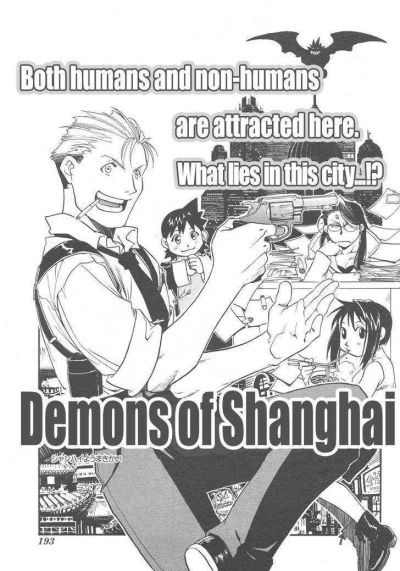Legend in My Living Room
Demons of Shanghai
By Hiromu Arakawa

2 Oct, 2019
Hiromu Arakawa’s 2000 Demons of Shanghai (Shanghai Yōmakikai) was a short-lived urban-fantasy manga.
Shanghai in 2050 is a thoroughly modern city with thoroughly modern amenities. Alas, it is also home to more traditional beings: gods, demons, and other supernatural entities. Such creatures are more than the city officials, even the police, can manage.
For those, the city has no choice but to reluctantly call on the Demon Taoists Corporation.
Field agents Jack and Kuo are dedicated to their work, so much so that to the great distress of their boss Miss Ninetails, they leave a trail of destruction in their wake every time they resolve a wandering monster crisis. The citizens (or at least their representatives) are as reluctant to pay for the property damage and stolen food as they are eager to have their streets rid of supernatural attackers.
Young Su-An yearns to join Jack and Kuo in the field. Unfortunately for the young recruit, he has a skill even more valuable than his exhaustive knowledge of the supernatural. He can whip through paperwork. Accordingly, he is consigned to filling out forms.
What the public does not know (although Su-An does, once he learns more about his employers) is that the name of the company is more literal than most suspect. Su-An is the sole human working for the company. The Demon Taoists Corporation succeeds where others fail because its staff are themselves supernatural creatures.
Jack, for example, was quite famous for his exploits in 1888 Whitechapel.…
~oOo~
There aren’t all that many comedies featuring Jack the Ripper. The manga doesn’t dwell on his murders. This is probably for the best since the “murdered and dismembered at least five women” angle might detract from the fun.
This was only Arakawa’s second work. She is better known for her later manga, Fullmetal Alchemist. Unsurprisingly, this manga is less polished than Alchemist … but Alchemist does set a very high standard.
I found this work interesting as a glimpse into the author’s influences. They are much more obvious here than they are in Alchemist. I noted several elements that reminded me of the manga Dominion Tank Police; a city with a serious problems is forced to rely on self-indulgent eccentrics who seem little concerned with collateral damage1.
Although the Taoist shenanigans are doubtless stressful for the good people of Shanghai, the manga plays them for laughs. I was intermittently amused.
Demons of Shanghai is not available in an authorized edition. There are rumours that the author may write further instalments in the series.
1: Though one could argue that the “superheroes get a pass for collateral damage” trope may be ultimately traceable to Western comics. Although there’s a reason Tang Sanzang needed the “Ring Tightening Mantra” so perhaps western sources were not needed at all.
